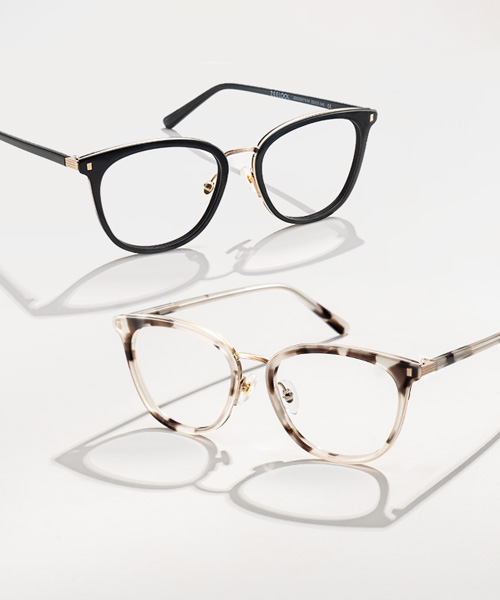Blue light glasses have become popular, but can you wear them outside? More and more of us now depend on these special glasses to filter blue-violet light from our screens. These glasses help reduce eye strain from digital devices that emit light at a 455nm wavelength, the main cause of headaches after prolonged screen time. The way they work, both indoors and outdoors, reveals some key differences.
You can safely wear blue light glasses all day indoors without any problems. Taking them outside is a different story. These glasses can filter anywhere from 50% to 100% of harmful blue light wavelengths. The manufacturers didn't design them with outdoor use in mind. Sunlight bouncing off the lenses can create extra glare and may affect your vision. This raises concerns about children's exposure to UV rays. Children receive approximately 80% of their lifetime UV exposure before they turn 18. Let's examine what these glasses do, whether they work outdoors, and the best times to wear or skip them.
What Are Blue Light Glasses and How Do They Work?
Blue light glasses are designed to protect your eyes from high-energy visible (HEV) blue light between 380 and 500 nanometers. The lenses use special coatings or embedded materials to filter specific light wavelengths. These glasses reduce ultraviolet light transmission between 440 and 500 nanometers.

What Do Blue Light Glasses Do?
The glasses shield your eyes from high-energy blue wavelengths and might help reduce eye strain from long screen time. The specially designed lenses filter out a specific amount of blue-violet light.
The science is still up for debate. Scientists have done more research on blue-blocking products since 2008. Studies haven't shown any substantial improvements in how well people see or sleep when using these lenses. A 2021 study looked at 120 computer users and found that blue light lenses didn't help with digital eye strain symptoms.
Types of Lenses: Clear, Yellow, Red
You'll find several types of blue light glasses that offer different levels of protection:
Clear lenses block about 20% to 40% of the blue light spectrum (around 400 to 440 nm). People use these during the day since they filter about 50% of blue light across the spectrum.
Yellow lenses give you stronger protection by blocking all blue light in the 400-455 nanometer range. These work better during the day when you need maximum protection from blue light.
Red or amber lenses give you the most detailed protection. They block all blue light and sometimes even green light up to 550nm. People wear these at night to help with sleep and maintain their natural body clock.
How They Filter Artificial vs Natural Light
Blue light glasses were designed to protect us from artificial light from screens rather than sunlight. Digital devices actually emit nowhere near the blue light levels found in natural daylight. The sun gives off about a thousand times more blue light than artificial sources.
Different colored lenses target specific wavelengths of light. Daytime computer glasses focus on blocking the main blue light wavelength from devices and LED lights (440-455nm). Night-time glasses with amber or red tints block all blue light so your body can produce melatonin naturally.
Can You Wear Blue Light Glasses Outside?
Many users miss a key difference about using blue light filters outdoors. Let's get into what happens when you step outside wearing them.

Blue Light From the Sun vs Screens
Natural sunlight gives off the most blue light we encounter daily. You might be surprised to learn that one hour outside on a cloudy day exposes your eyes to about 30 times more blue light than an hour of screen time. The sun puts out way more blue wavelengths, which makes our sky look blue.
Natural blue light works differently from artificial sources and helps our bodies in several ways. Blue wavelengths from the sun help keep our sleep cycle on track, make us more alert, and boost our brain function. These benefits make natural blue light crucial for good health.
Do They Protect Against Sunlight?
You can wear blue light glasses outside, but they're not designed for that. These glasses focus on blocking artificial blue light from screens and LED lights. They only filter 15-20% of blue light, which doesn't protect you enough from the sun's powerful rays.
It also doesn't shield your eyes from harmful UV rays. You need real sunglasses with 100% UV protection for outdoor activities, especially when you have bright conditions like being on water or snow.
Potential Risks With Glare Outdoors
Blue light glasses can actually create more problems outside by increasing glare. The lens coatings can actually reflect strong sunlight, creating more glare instead of reducing it. Bright sunny days can make this really noticeable.
These glasses might also block natural blue light that your body needs. As one expert says, "It's best not to wear blue light glasses when you're outside in the sun—simply because there is no need, and you do not want to filter the beneficial natural light from your eyes".
When Should You Wear Blue Light Glasses?
The right time to wear blue light glasses can help you get the most out of them. Research points to several situations where these specialized lenses work best.
Blue light glasses can help during long computer sessions. You might benefit from clear lens blue light filtering glasses if you spend about 4 hours daily on your computer, or closer to 8 hours as a remote worker. These glasses could reduce eye discomfort. The same applies to long periods of smartphone or tablet use since these devices emit blue-violet light.

LED lighting in conference halls, classrooms, and offices creates another good opportunity to wear blue light glasses. Many users find the blue light from these artificial sources uncomfortable after long exposure.
The evening hours need extra attention. Blue light can stop melatonin production - the hormone that helps us sleep. Wearing blue light glasses with red or amber lenses before bedtime might lead to better sleep. This makes sense after sunset while using artificial lighting.
All the same, the science behind blue light glasses shows mixed results. A complete review of 17 studies found no real advantage in using blue-light-filtering glasses over standard lenses to reduce eye strain. Sleep improvement results varied too, with all but one of these trials showing most important improvements.
You could try these alternatives instead of buying specialized glasses:
- Cut down your screen time
- Take breaks often while using digital devices
- Use "night shift" or "dark mode" on devices at night
- Keep proper distance from screens (8-10 feet from TVs)
You should see an eye care professional if eye discomfort persists. Why it happens could be conditions like farsightedness or dry eye disease.
When Not to Wear Blue Light Glasses
Knowing when not to use blue light glasses is just as important as understanding their benefits. These glasses work well indoors, but they might not help in certain situations.
Avoiding Use in Natural Sunlight
The sun emits far more blue light than any digital device. Your typical electronic device's blue light output is nothing compared to natural daylight. You don't need to wear blue light glasses outside, and doing so might actually work against you. The sun's blue light helps your body maintain its internal clock and keeps your brain working properly.
For outdoor use, regular sunglasses with UV protection are your best option. They give you complete protection from harmful UV rays while letting the right amount of blue light reach your eyes. Blue light glasses aren't built for outdoor use and might create more glare when you're in the sun.
Why Red Lenses Are Not for Daytime
Red-tinted lenses block almost all blue and green wavelengths (up to 550 nm). This heavy filtering helps at night to boost melatonin, but these glasses can cause real issues during the day.
Your brain gets confused when you wear red lenses in daylight. It thinks it's nighttime when it's not, creating what experts call "circadian mismatch". This throws off your body's natural rhythms. Your energy levels can drop, you might feel tired, and your mood could get worse when you block too much blue light during the day.
Impact on Circadian Rhythm if Misused
Our bodies control melatonin production based on different light wavelengths throughout the day. Blue-enriched light during daytime helps keep our internal 24-hour clock running smoothly.
Using blue light glasses incorrectly can mess with this natural pattern, especially when you wear heavy-filtering amber or red lenses during the day. Research shows that nighttime blue light can disrupt sleep, but blocking good blue light during the day creates its own problems. Your eyes might even become more sensitive to blue light over time.
Blue light glasses ended up working best when used at the right time - mainly with artificial light and digital screens - instead of wearing them all day.
The Bottom Line
Blue light glasses definitely have their place in our screen-filled world. This piece shows these specialized glasses work best when used strategically, not as a catch-all solution. They can help reduce eye strain during long computer sessions, but wearing them outdoors defeats their purpose and might increase glare.
The scientific evidence behind blue light glasses isn't fully clear yet. Users often report benefits, but research hasn't showed consistent improvements in vision performance or reduced eye strain.
If you're considering getting blue light glasses, timing is crucial. Clear lenses are ideal for daytime screen use, while amber or red lenses are most effective in the evening hours. Your circadian rhythm can get disrupted if you wear red-tinted glasses during the day, and you might feel tired.
Blue light glasses can't replace proper UV-protective sunglasses outdoors. The sun puts out about a thousand times more blue light than any digital device, so you need specialized eye protection beyond what blue light filters offer.
Simple lifestyle changes may be more effective than purchasing specialized eyewear. Regular screen breaks, proper viewing distance, and your device's built-in night mode can be just as effective for many people. If your eyes still feel strained after trying these tips, consult an eye care professional.


























